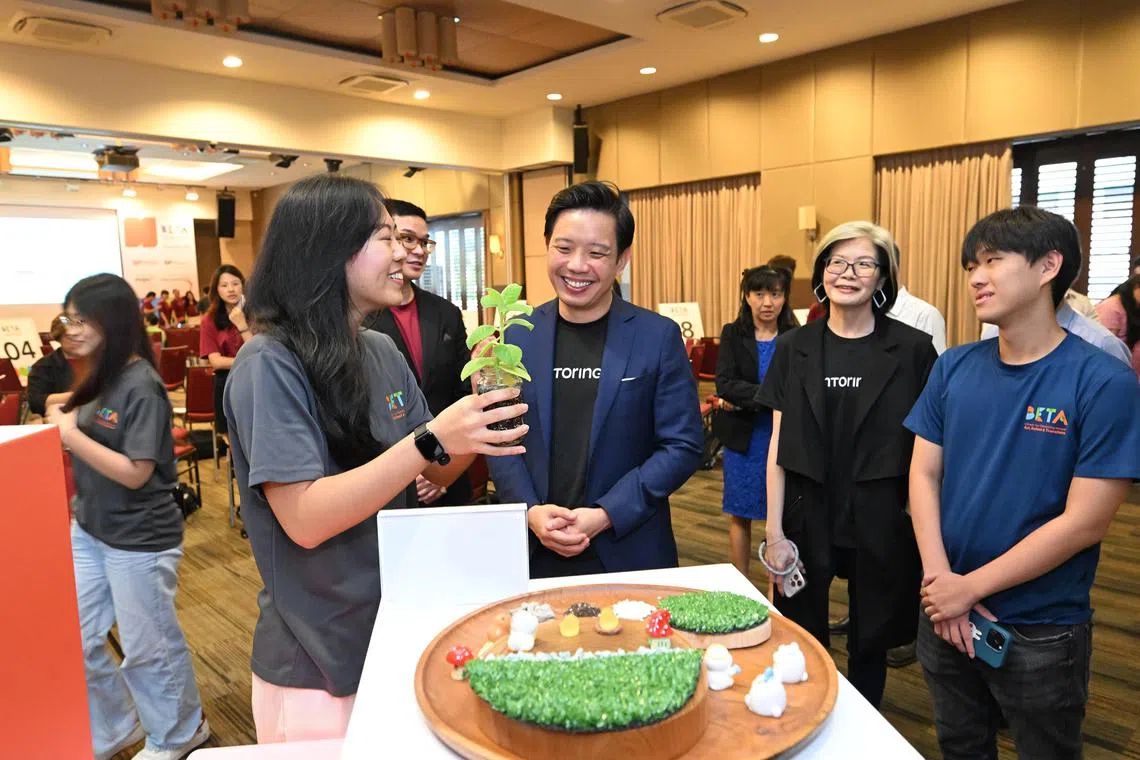Student-run businesses offer real-world experience for Singapore Polytechnic students
The TL;DR: Singapore Polytechnic launched an enhanced programme that will commence in 2025. The programme, which is compulsory for all first-year business students, gives them a taste of what it’s like to run a business.
Sign up now: Get ST's newsletters delivered to your inbox

Ministry of Culture, Community and Youth Alvin Tan speaks to students from the start-up Flourish on Nov 15.
PHOTO: SINGAPORE POLYTECHNIC
SINGAPORE – Upon entering Singapore Polytechnic (SP), students enrolled in its School of Business (SB) will be given a taste of the world of business and run their own start-ups for a year.
From April 2025, when the 2025/26 academic year starts, all first-year students across 30 classes and five diploma programmes in SB will take Business Essentials Through Action (Beta) as a module.
Mr Lucas Tok, acting deputy senior director of SP’s Business & Creatives Cluster, said: “We found that students will remember more when they actually apply what they learn and solve problems on their own, so learning from failure is more impactful.”
Students’ grades will be based not on the amount of profits earned at the end of the module, but rather on the effective management of seed funding given to them, he added.
The Beta programme was first piloted in 2020 with only two classes comprising 36 Year 1 business students, a few of whom were able to receive guidance from industry experts.
Under the enhanced version of the programme, about 600 students are expected to participate in multidisciplinary classes. Industry experts will also be coming on board as mentors again, but with greater involvement – they will mentor students at various touchpoints, beyond just giving them feedback at the end of the module.
In previous years of the module, the school was not able to give all students exposure to industry experts due to limited resources and time. Mr Tok said: “This is the first time we are working with partners to bring in more industry mentors so that all the students have access to them and can really work on their business.”
Experiencing the real world
In groups of five, students are tasked with designing a business plan based on a gap they have identified within society, with an emphasis on tackling sustainability issues such as sustainable consumption.
The groups pitch their ideas to their lecturers and industry partners, with two winning teams from each class receiving seed funding of $1,000. Members of the remaining teams then join one of the two winning teams for the rest of the project.
Mr Venkat Alagappan, 18, a Year 1 business administration student who is doing the Beta module, said: “I don’t normally enjoy presentations, but as I am passionate about my business, I love the challenge that comes with presenting our idea to our lecturers and convincing them that our business is worth investing in.” His group is selling shirts with motifs of Greek gods.
The teams will create their prototypes using the money, and refine them until they have products that are ready to be sold.
Business administration student Merla Bhuvanesh, 17, said: “The very fact that you get to see your idea come to life, and learn from the process of selling it while having lots of fun at the same time, is what I like most (about Beta).”
The enhanced Beta module was developed in partnership with the National Volunteer and Philanthropy Centre and supported by Mentoring SG.
Industry experts from companies will advise students if their business ideas are feasible.
Mr Tok said: “Industry experts will walk them through considerations and point out blind spots that students may not have seen, through their experience of being in the real world.”
Some of the start-ups students in the 2024/2025 academic year are working on include upcycling jars into terrariums and making eco-friendly air fresheners from recycled coffee grounds.
At the end of the module, the students will showcase their final products and put them up for sale to the public.


